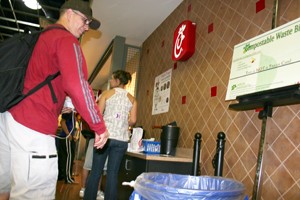ASUA wants your trash!
The Associated Students of the University of Arizona Sustainability Committee is in the process of collecting and weighing compost from Nov. 17 to Nov. 20 of this week to see if the university could feasibly purchase a compost machine.
“”The audit we’re doing is for the composting project,”” said Lesley Ash, ASUA sustainability director. “”We are applying for several grants in the spring from the Arizona Department of Environmental Quality, the Environmental Protection Agency, to hopefully fund the purchase of an in-vessel composting system to put out at campus (agriculture).””
Before the UA can apply for grants to purchase the machine, they must first see how much it would be used, Ash said.
“”This week we’re doing a student-based waste audit,”” Ash said. “”This waste audit is to measure the amount of post-consumer compostable waste that the student body generates on a daily basis.””
Ash said that she and other volunteers have been tracking the compost output of the Student Union Memorial Center over the past month and a half, but that it is now time to set up compost waste bins to track students’ usage habits as well.
“”We have seven compostable waste bins actually set out right now in the main student union,”” Ash said. “”There are five in the main part of the food court and then two up in Cactus Grill, and they all have large poster by them saying, ‘This is a compostable waste bin. This is what you can put in it.'””
While not all waste, such as Styrofoam, is necessarily compostable, there is definitely a long list of what can go in the bins, Ash said.
“”You can compost meat, fruit, vegetables, any type of bread-based products, coffee grinds, and also you can compost those Coca-Cola paper cups that are currently being used in the student union,”” Ash said.
Chris Kopach, the associate director of facilities management at the UA, said that the compost project fits well with the UA’s overall desire to be as “”green”” as possible.
“”We’re looking at something bigger, as far as ‘is it possible to compost?’ Are we able to compost the scrap material, what we’re getting from the kitchens, from the student union in combination with our green waste on campus?”” Kopach said.
In order for this or other green initiatives to be successful at the UA, the student body must be a participant, Ash said.
“”This is just one of the many factors that we’re doing, and it just goes back to kind of a getting-back-to basics stance, in the sense that we want to increase sustainability,”” Ash said. “”When it comes back to the student body, it just has to do with recognizing if I have things I can compost, I will put them in the compost bin versus the trash. Just simple efforts and steps during the day that the student body can take to increase campus sustainability.””
Larry Jones, assistant director of operations at the SUMC, said that the idea of recycling is nothing new.
“”There was a recycling program long before I ever got in the building,”” Jones said. “”We have kind of had to go with the market in terms of what we recycle. Right now we’re recycling blank paper newsprint No. 1, No. 2 plastic, tin, aluminum and cardboard. Cardboard is by far the biggest recycle unit that we have.””
Jones said that while recycling is not always the easiest solution, it is always the right thing to do.
“”It is like recycling of any kind. If you were to look at recycling from a financial standpoint, it is not always cost effective to recycle goods,”” Jones said. “”It is what you have got to do. We would be silly to not be recycling what we can in the union. That’s why we do recycle what we can.””









